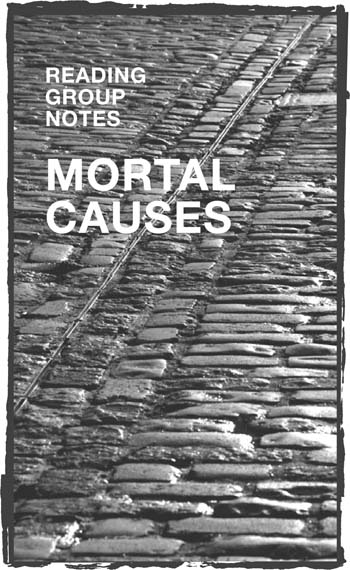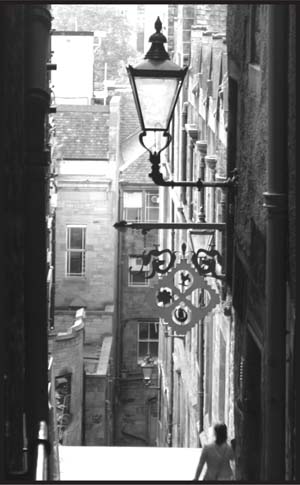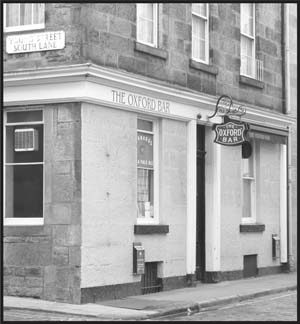Mortal Causes (38 page)
Authors: Ian Rankin

And now the fire engines were arriving, men leaping out of cabs, doing things with hoses. One of them complained about the police car. The keys were in the ignition, so the fireman backed it up.
At last Rebus could speak. ‘You did that?’ he asked. It was a stupid question. Hadn’t he given Cafferty nearly all the information he’d needed?
‘I saw you going in,’ Cafferty said, his voice raw. ‘You were gone a long time.’
‘You could have let me die.’
Cafferty looked at him. ‘I didn’t come in for
you
. I came in to stop you bringing out that bastard Fowler. As it is, Moncur’s done a runner.’
‘He can’t run far.’
‘He better try. He knows I won’t give up.’
‘You knew him, didn’t you? Moncur, I mean. He’s an old pal of Alan Fowler’s. When Fowler was UVF, the UVF laundered money using your salmon farm. Moncur bought the salmon with his good US dollars.’
‘You never stop.’
‘It’s my business.’
‘Well,’ said Cafferty, glancing back at the club, ‘this was business, too. Only, sometimes you have to cut a few corners. I know
you
have.’
Rebus was wiping his face. ‘Problem is, Cafferty, when you cut a corner, it bleeds.’
Cafferty studied him. There was blood on Rebus’s ear, sweat cloying his hair. Davey Soutar’s blood still spattered his shirt, mixed now with smoke. And Kilpatrick’s handprint was still there. Cafferty stood up.
‘Not thinking of going anywhere?’ Rebus said.
‘You going to stop me?’
‘You know I’ll try.’
A car drew up. In it were Cafferty’s men, the two from the kirkyard plus weasel-face. Cafferty walked to the car. Rebus was still sitting on the pavement. He got up slowly now, and walked towards the police car. He heard Cafferty’s car door shutting, and looked at it, noting the licence plate. As the car passed him, Cafferty was looking at the road ahead. Rebus opened his own car and got on the radio, giving out the licence number. He thought about starting his engine and giving chase, but just sat there instead, watching the firemen go about their business.
I played it by the rules, he thought. I cautioned him and then I called in. It didn’t say in the rules that you had to have a go when there were four of them and only one of you.
Yes, he’d played it by the rules. The good feeling started to wear off after only minutes, and damned few minutes at that.
They finally picked Clyde Moncur up at a ferry port. Special Branch in London were dealing with him. Abernethy was dealing with him. Before he’d left, Rebus had asked a simple question.
‘Will it happen?’
‘Will what happen?’
‘Civil war.’
‘What do you think?’
So much for that. The story was simple. Moncur was visiting town to see how the money from US Shield was being spent. Fowler was around to make sure Moncur was happy. The Festival had seemed the perfect cover for Moncur’s trip. Maybe Billy had been executed to show the American just how ruthless SaS could be …
In hospital, recovering from his stab wounds, DCI Kilpatrick was smothered to death with his pillow. Two of his ribs had been cracked from the weight of his attacker pressing down on him.
‘Must’ve been the size of a grizzly,’ Dr Curt announced.
‘Not many grizzlies about these days,’ said Rebus.
He phoned the Procurator Fiscal’s office, just to check on Caro Rattray. After all, Cafferty had spoken of her. He just wanted to know she was okay. Maybe Cafferty was out there tying up a lot of loose ends. But Caro had gone.
‘What do you mean?’
‘Some private practice in Glasgow offered her a partnership. It’s a big step up, she grabbed it, anyone would.’
‘Which office is it?’
Funny, it was the office of Cafferty’s own lawyers. It might mean something or nothing. After all, Rebus
had
given Cafferty some names. Mairie Henderson had gone down to London to try to follow up the Moncur story. Abernethy phoned Rebus one night to say he thought she was terrific.
‘Yes,’ said Rebus, ‘you’d make a lovely couple.’
‘Except she hates my guts.’ Abernethy paused. ‘But she might listen to you.’
‘Spit it out.’
‘Just don’t tell her too much, all right? Remember, Jump Cantona will take most of the credit anyway, and wee Mairie’s been paid upfront. She doesn’t
have
to bust a gut. Most of what she’d say wouldn’t get past the libel lawyers and the Official Secrets Act anyway.’
Rebus had stopped listening. ‘How do you know about Jump Cantona?’ He could almost hear Abernethy easing his feet up onto the desk, leaning back in his chair.
‘The FBI have used Cantona before to put out a story.’
‘And you’re in with the FBI?’
‘I’ll send them a report.’
‘Don’t cover yourself with too much glory, Abernethy.’
‘You’ll get a mention, Inspector.’
‘But not star billing. That’s how you knew about Mairie, isn’t it? Cantona told the FBI? It’s how you had all the stuff on Clyde Moncur to hand?’
‘Does it matter?’
Probably not. Rebus broke the connection anyway.
He shopped for a coming home meal, pushing the trolley around a supermarket close to Fettes HQ. He wouldn’t be going back to Fettes. He’d phoned his farewell to Ormiston and told him to tell Blackwood to cut off his remaining strands of hair and be done with it.
‘He’d have a seizure if I told him that,’ said Ormiston. ‘Here, what about the Chief? You don’t think …?’
But Rebus had rung off. He didn’t want to talk about Ken Smylie, didn’t want to think about it. He knew as much as he needed to. Kilpatrick had been on the fringe; he was more useful to The Shield that way. Bothwell was the executioner. He’d killed Billy Cunningham and he’d ordered the deaths of Millie Docherty and Calumn Smylie. Soutar had done his master’s bidding in both cases, except Millie had proved messy, and Soutar had left her where he’d killed her. Bothwell must have been furious about that, but of course Davey Soutar had other things on his mind, other plans. Bigger things.
Rebus bought the makings for the meal and added bottles of rosé champagne, malt whisky and gin to the trolley. A mile and a half to the north, the shops on the Gar-B estate would be closing for the evening, pulling down heavy metal shutters, fixing padlocks, double-checking alarm systems. He paid with plastic at the check-out and drove back up the hill to Oxford Terrace. Curiously, the rust bucket was sounding healthier these days. Maybe that knock from Hay’s van had put something back into alignment. Rebus had replaced the glass, but was still debating the doorframe.
At the flat, Patience was waiting for him, back from Perth earlier than expected.
‘What’s this?’ she said.
‘It was meant to be a surprise.’ He put down the bags and kissed her. She drew away from him slowly afterwards.
‘You look an absolute mess,’ she said.
He shrugged. It was true, he’d seen boxers in better shape after fifteen rounds. He’d seen punchbags in better shape.
‘So it’s over?’ she said.
‘Finishes today.’
‘I don’t mean the Festival.’
‘I know you don’t.’ He pulled her to him again. ‘It’s over.’
‘Did I hear a clink from one of those bags?’
Rebus smiled. ‘Gin or champagne?’
‘Gin and orange.’
They took the bags into the kitchen. Patience got ice and orange juice from the fridge, while Rebus rinsed two glasses. ‘I missed you,’ she said.
‘I missed you, too.’
‘Who else do I know who tells awful jokes?’
‘Seems a while since I told a joke. It’s a while since I heard one.’
‘Well, my sister told me one. You’ll love it.’ She arched back her head, thinking. ‘God, how does it go?’
Rebus unscrewed the top from the gin bottle and poured liberally.
‘Whoah!’ Patience said. ‘You don’t want us getting mortal.’
He splashed in some orange. ‘Maybe I do.’
She kissed him again, then pulled away and clapped her hands. ‘Yes, I’ve got it now. There’s this octopus in a restaurant, and it’s –’
‘I’ve heard it,’ said Rebus, dropping ice into her glass.

 © Rankin
© RankinABOUT IAN RANKIN
Ian Rankin, OBE, writes a huge proportion of all the crime novels sold in the UK and has won numerous prizes, including in 2005 the Crime Writers’ Association Diamond Dagger. His work is available in over 30 languages, home sales of his books exceed one million copies a year, and several of the novels based around the character of Detective Inspector Rebus – his name meaning ‘enigmatic puzzle’ – have been successfully transferred to television.
 Introduction to DI John Rebus
Introduction to DI John RebusThe first novels to feature Rebus, a flawed but resolutely humane detective, were not an overnight sensation, and success took time to arrive. But the wait became a period that allowed Ian Rankin to come of age as a writer, and to develop Rebus into a thoroughly believable, flesh-and-blood character straddling both industrial and post-industrial Scotland; a gritty yet perceptive man coping with his own demons. As Rebus struggled to keep his relationship with daughter Sammy alive following his divorce, and to cope with the imprisonment of brother Michael, while all the time trying to strike a blow for morality against a fearsome array of sinners (some justified and some not), readers began to respond in their droves. Fans admired Ian Rankin’s re-creation of a picture-postcard Edinburgh with a vicious tooth-and-claw underbelly just a heartbeat away, his believable but at the same time complex plots and, best of all, Rebus as a conflicted man trying always to solve the unsolvable, and to do the right thing.
As the series progressed, Ian Rankin refused to shy away from contentious issues such as corruption in high places, paedophilia and illegal immigration, combining his unique seal of tight plotting with a bleak realism, leavened with brooding humour.
In Rebus the reader is presented with a rich and constantly evolving portrait of a complex and troubled man, irrevocably tinged with the sense of being an outsider and, potentially, unable to escape being a ‘justified sinner’ himself. Rebus’s life is intricately related to his Scottish environs too, enriched by Ian Rankin’s attentive depiction of locations, and careful regard to Rebus’s favourite music, watering holes and books, as well as his often fraught relationships with colleagues and family. And so, alongside Rebus, the reader is taken on an often painful, sometimes hellish journey to the depths of human nature, always rooted in the minutiae of a very recognisable Scottish life.

